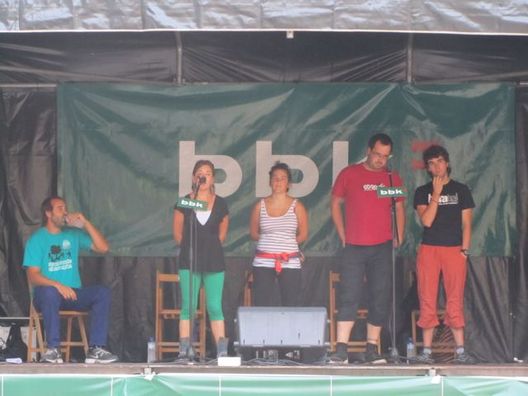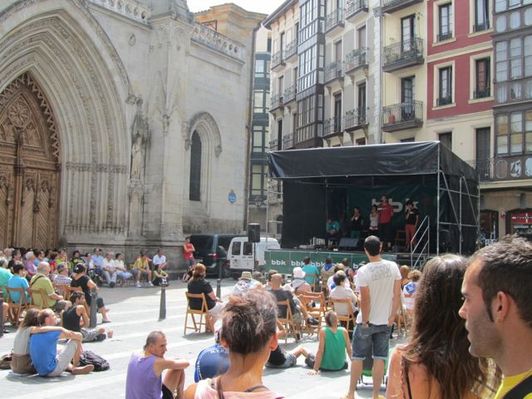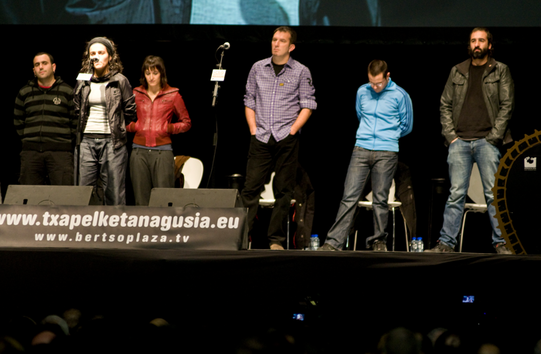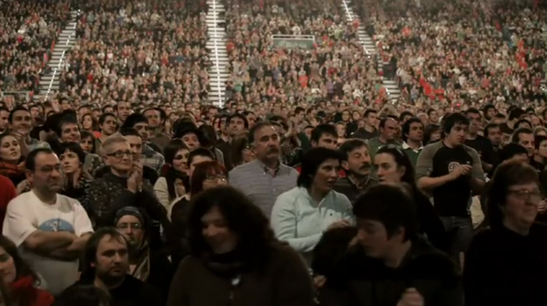The fiesta week gave us an opportunity to experience something of Basque folk culture, a major part of the fiesta programme. Folk dance, music and verse happened in various parts of the old town each day. (There were also some ‘country sports’: we briefly caught sight of some bale-tossing and some stone-lifting, but alas there didn’t seem to be any espadrille-tossing on display…)
Did you know that there is an ancient Basque oral tradition of improvised verse-chanting? Neither did we – and this turned out to be the most surprising and fascinating discovery of the week.
The tradition of ‘bertsolaritza’ is quite unlike anything else I’ve seen, although it is in some ways related to popular rhythmic traditions such as rap, or poetry slams, or even religious chant. The singers are called ‘bertsolariak’ (plural of 'bertsolari') and the verse they sing is called ‘bertso’. (In case you’re wondering, the etymological origin of the word ‘bertso’ is the same as the English 'verse', Latin ‘versus’: Basque is NOT related to Latin in any way, but has borrowed many words from Latinate languages.)
In the events that we saw (see pictures below) four bertsolaris (who appeared to be fairly ordinary young people who might or might not be students / intellectuals – not sure…) stood on a stage and performed in front of a sizeable audience (of all ages) in the square in front of the cathedral. There was also a compère of some sort, who introduced each part of the performance. First, all four singers performed on stage together, each one appearing to respond to the one before. Then they performed in pairs, again appearing to respond to each other. Then they performed alone. Apparently, it was a competition. The audience followed intently and appeared to know the chant-tunes and the closing lines of many of the chants, which they joined in with. Each day, a new group of 4 performers participated.
Of course, I couldn’t understand a word of any of it, since it was all in Euskara, but the whole phenomenon seemed fascinating. I had to go away and read to find out what was going on. Here is a basic explanation from a very interesting essay I found: (http://www.criticalimprov.com/article/viewArticle/939/1610, ‘Resisting Poems: Expressions of Dissent and Hegemony in Modern Basque Bertsolaritza’, in case you’re interested.)
“The practice of bertsolaritza is based on the ability of the performers to improvise, in Basque, a sung verse on a pre-determined theme while respecting a set of strict rules determining rhythm and rhyme… A typical performance will feature two or more improvisers as well as a ‘game leader.’ The game leader announces the theme (which may pertain to a large variety of local, national, or international matters and is usually addressed in either a poetic or humorous tone) and imposes a rhythm to be followed by all of the performers. It is then up to the bertsolaris to choose a suitable melody (typically selected from a corpus of well-known traditional tunes), find the proper rhymes, and elaborate the content of their bertso.”
Bertsolaritza might happen “in informal settings (spontaneous performances by amateur or student performers), at more formal social events (weddings, funerals, village balls), or at competitions”, and a typical event might include four different types of ‘games’, such as at the national championships, where performance was structured as follows:
“A type of role-play where each improviser acted as a pre-defined character; an exercise where bertsolaris were asked to improvise the rest of a poem after being given the first verse; another exercise where they had to create a four-verse poem based on four given words inspiring each verse; and finally, a game where each bertsolari had to improvise three poems on a single theme (the same theme applied to all contestants).”
What is the origin of all this?
“The practice of improvised sung poetry is an old Basque tradition. The first written records of a bertsolaritza performance date back to the mid-fifteenth century… Its original setting was rural, and performances often had a clear social function, occurring at village balls, funerals, or weddings. The role of bertsolaris has always been to provide entertainment in addition to commenting on social conditions. As Jon Sarasua explains most eloquently: “the role played by the verse-maker is a cross between that of communicator and poet, leader and jester, newspaper columnist and satirical cartoonist, while at the same time he or she is also an ordinary participant in that social environment”.
(Like many Basque things, it’s quite possible that the tradition goes back many centuries further: it’s now believed, apparently, that the Basque people may have been living in the Basque country as far back as the stone age!)
And what is its cultural significance in modern Basque society? Is it quaint old stuff like morris dancing in England, or is it something with more cultural clout (as seemed to be the case in the events I witnessed)? Well, the conclusion of the essay is as follows:
“Many bertsolaris are cultural and sometimes political activists at odds with the French and Spanish governments that refuse to grant the Basques full self-determinacy… Bertsolaris, as masters and promoters of the Basque language, often either self-identify or are perceived by their audiences as patriots, nationalists, or even separatists.”
“…In today’s Basque world, the role of bertsolaritza is two-fold. On the one hand, it consolidates the ideals of a Basque national identity based primarily on the Basque language (Euskara), and its popularity has reached hegemonic proportions. On the other hand, to the outside world, Basque oral improvised poetry represents Basque singularity by positing an ambiguous, yet undeniable, discourse of resistance to other, transnational forms of political, economic, and cultural hegemonies.”
With further research online, I found the following fascinating video (do watch it: it’s really excellent., a trailer for a longer documentary, with English subtitles!) which focuses on modern bertsolaritza, and shows footage of the national championship – in a huge arena with thousands of people in the audience: http://vimeo.com/9355066/ - some pictures below:
And indeed, this is one extraordinary thing that we are learning – that the degree of popular engagement with Basque culture of all kinds (sport, music, dancing, festivals, etc.) is exceptionally high, and of an exceptionally high quality, and this clearly has a great deal to do with aspirations to nationality. It also seems to produce a very high level of social cohesion – but also potentially of social exclusivity.
Yesterday, we went to the seaside town of Bermeo (more on this trip later.) By chance, the town’s fiesta was on, and there were thousands of people on the streets. We noticed how extraordinarily mono-ethnic the population was (far more so than in relatively multi-cultural and metropolitan Bilbao): for instance, almost every single person had the black hair that is typical of the Basques. This is a people that has probably lived here since the stone age, and has never been fully occupied or invaded (the Basque country, for instance, was one of the very few parts of Spain not to have been conquered by the Arabs.) – and yet do not have their own nation. No wonder the local culture is so powerful.
We felt very much like outsiders – a feeling intensified by the fact that almost every one of the thousands of people in town was wearing blue clothes and blue neckerchiefs – blue being the colour of the local rowing team, competing in a regatta in the harbour that afternoon. The only exceptions were a few unsuspecting tourists like ourselves – and the African immigrants who (as in Bilbao) appeared to be there only to sell their wares to the fiesta-goers. (Pietro actually bought a blue t-shirt in a local shop as he felt so conspicuous wearing light brown!)
And all this is of course related to the question one is constantly made to think about here: nationalism, good or bad? Catalunya has been in the news this week – following the Spanish government’s latest package of austerity measures, there was a massive demonstration of 1.5 million people in Barcelona, with polls showing 50% of the population of the region pro-independence- despite the already high levels of autonomy that Catalunya already has. And the Basque Country is not far behind.
What does all this nationalism signify? (We might ask the same about Scotland, too.) To what extent is it propelled by a legitimate struggle for self-determination against a restrictive conservative mainstream (which in the case of Spain has still not distanced itself adequately from Francoism) and the historical imposition of arbitrary borders? To what extent is it propelled by ethnic exclusivity and economic materialism? (Catalunya and the Basque Country are the richest regions of Spain: one can’t help feeling that part of the problem is that they don’t want to share what they have with the poor South – although one hesitates to make comparisons between attitudes in the fascist-tending north of Italy, and the socialist-tending north of Spain!)
Answers on a postcard, please….
Next time: Txistulariak….





 RSS Feed
RSS Feed